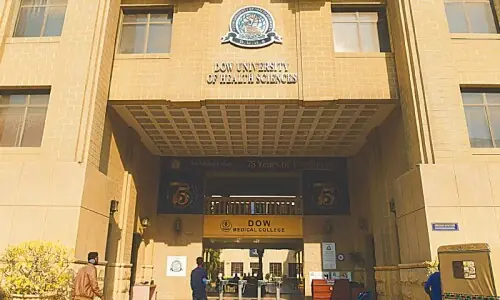KARACHI: In the past, religious identities were fluid in the subcontinent. The British had a clear notion of identity, so they crystallised it. Partition aggravated it. This was the gist of the ideas that the husband-wife writing duo Haroon Khalid and Anam Zakaria expounded as they discussed the salient features of their books In Search of Shiva and The Footprints of Partition at an event organised by the Desi Writers’ Lounge (DWL) at T2F on Friday evening.
Afia Aslam, who intelligently moderated the programme, said she first met the couple at the inaugural Lahore Literature Festival when they were on the verge of publishing. She then asked them to introduce themselves.
Mr Khalid said he had an academic background in anthropology from the LUMS and his work mainly focused on the alternative history of Pakistan. He said his earlier book was A White Trail: a Journey into the Heart of Pakistan’s Religious Minorities and now he had come out with In Search of Shiva. Ms Zakaria said she had a development background, focusing on education, but not formal education. She said during her research for The Footprints of Partition she found out that partition was not just a historic event, it was an ongoing process.
The first question that Ms Aslam put to the two guests was the overlap in their research processes as they had trips in Punjab together. Ms Zakaria said when she went along with her husband for research she had more clarity as they drew each other’s attention to different things. She said the presence of someone from the opposite gender was crucial to the research process because there were places, such as in Kashmir, where a lot of people were not comfortable talking to a lady. Mr Khalid seconded her opinion saying the gender aspect was important. He said there were overarching themes (nationalism ethnic identity) that coincided, and whereas his wife was more critical, his interest lay in syncretism or lack of it.
At Ms Aslam’s request Mr Khalid narrated an amusing story that they discovered during research. Discussing a shrine near Jhang, he said Heer (from the folk love story Heer Ranjha) was a Sayal, and his wife (Anam Zakaria) too was a Sayal. In another folk tale Mirza Sahiban, he said, Mirza’s mother told her son that Sahiban was a Sayal like Heer and that the Sayal women couldn’t be trusted.
Answering a question about the content of his book In Search of Shiva Mr Khalid said in the countries which were not colonised (like Nepal and China) religious identities were fluid, because in Nepal one could be a Hindu as well as a Buddhist. When the British came to the subcontinent, he said, they had a clear notion of identity, that is, if one was a Christian then one couldn’t be a Muslim. “That’s how we saw ourselves,” he said. It crystallised things, he said, adding partition aggravated it.
Responding to the query about the folk practices in the historical context, Mr Khalid said there was a shrine near Kasur where Besakhi Festival took place in April. He said it’s a Hindu shrine but visited by Muslim devotees. He said even Hindus visited Data Darbar and Sikhs revered Baba Farid.
On Shiva, Mr Khalid said his research suggested that Shiva represented fertility cult. He said Shiv’s earlier form could be traced back to the days of Moenjodaro. Arians adopted Shiva and now mainstream Hindus owned him. He said he came across a shrine where dogs were considered sacred. Later on he found out that Shiva had a pack of dogs. He said Shiva was half male and half female.
Mr Khalid called partition a shock to religious practices which were reinterpreted after partition. He said attempts were made to sanctify those practices. He termed 9/11 the second blow where shrines were regarded as Islamic shrines.
Ms Zakaria echoed her husband’s views when she spoke about her book The Footprints of Partition. She said before she started her research she had a linear understanding of things (that history began after partition). But when she undertook research she realised there was coexistence in the region, she said, adding there were still melas where Indians and Pakistanis came together. She then read out an excerpt from her book to back up her argument.
Published in Dawn, March 12th, 2016




































